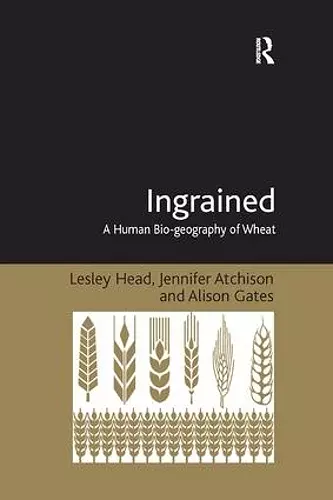Ingrained
A Human Bio-geography of Wheat
Lesley Head author Jennifer Atchison author
Format:Paperback
Publisher:Taylor & Francis Ltd
Published:15th Nov '16
Currently unavailable, and unfortunately no date known when it will be back
This paperback is available in another edition too:
- Hardback£160.00(9781409437871)

Plants are fundamental players in human lives, underpinning our food supply and contributing to the air we breathe, but they are easy to take for granted and have received insufficient attention in the social sciences. This book advances understanding of human-plant relations using the example of wheat. Theoretically, this book develops new insights by bringing together human geography, biogeography and archaeology to provide a long term perspective on human-wheat relations. Although the relational, more-than-human turn in the social sciences has seen a number of plant-related studies, these have not yet fully engaged with the question of what it means to be a plant. The book draws on diverse literatures to tackle this question, advancing thinking about how plants act in their worlds, and how we can better understand our shared worlds. Empirically, the book reports original ethnographic research on wheat production, processing and consumption in a context of globalisation, drought and climate change and traces the complex networks of wheat using a methodology of 'following' it and its people. The ethnobotanical study captures a number of moments in the life of Australian wheat; on the farm, at the supermarket, in the lives of coeliac sufferers, in laboratories and in industrial factories. This study demands new ways of thinking about wheat geographies, going beyond the rural landscape to urban and industrial frontiers, and being simultaneously local and global in perspective and connection.
'Where does a crop leave off and the rest of the world begin? Head, Atchison and Gates answer this difficult question by confronting not only what it is to be a plant but also what it is to be human. More than a book about Triticum, Ingrained compellingly asks us to reconsider how we think about ourselves, global commodities, plant breeding, co-evolution and breakfast.' Paul Robbins, author of Lawn People: How Grasses, Weeds and Chemicals Make Us Who We Are 'Engagingly written and theorised, this book tracks the networks through which grass turned to "wheat" to become ingrained in a bumper crop of commodities and technologies from the molecular to the multinational. The ghostly flora of wheat - in all its own plantiness - comes alive in the intimately entangled geographies of humans and nonhumans. Ingrained is a delight to digest.' Kay Anderson, University of Western Sydney, Australia '... no matter what sort of geographer you are, you will get something, including an enjoyable read, from this book.' Geographical Research '[The authors] provide a book which is engagingly written and theorised, of a high academic standard, and a common subject approached in a non-conformist way. Moreover, the book emphasises the cultural dimension of the environmental debate, a factor that is often given insufficient attention. This publication appeals to an audience searching for new ways of interdisciplinary thinking, as it integrates rural, urban and industrial frontiers, and offers both local and global perspectives.' International Journal of Environment and Pollution 'Overall, the book lies somewhere between a highly educational text and an intriguing work of non-fiction. It provides a fascinating insight into the manner in which wheat is integrated into our everyday lives. It is recommended to any member of the public with an interest in the role of wheat in society, and how it got there, as well as to the many industry professionals that would benefit from a broader knowle
ISBN: 9781138261662
Dimensions: unknown
Weight: 453g
246 pages